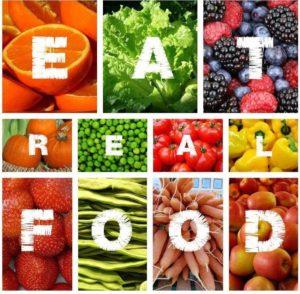 Our bodies are not designed to eat the kind of highly processed products sold by the giant food corporations, nor the synthetic chemical residues that cling to industrially raised produce, meat and dairy, nor genetically engineered foods that would never have developed in nature without human help.
Our bodies are not designed to eat the kind of highly processed products sold by the giant food corporations, nor the synthetic chemical residues that cling to industrially raised produce, meat and dairy, nor genetically engineered foods that would never have developed in nature without human help.
As one registered dietitian has put it, “The more we mess with the way food was intended to be grown and consumed, the more risk we take that it adversely affects our health down the line.”
While the specifics of any one person’s diet may differ, all healthful diets have one thing in common: Whole and minimally processed foods are the foundation and bulk of it. This is what we’re talking about when we talk about “real food” – the sustenance we need and deserve.
Here are 9 reasons – among many more and in no particular order – why real food matters:
- Real food is bigger than just the food itself. Our local and global economies, our environment, our health and our well-being all depend on sustainable, whole foods. “The time” for change “is ripe!” say the folks at Real Food Challenge. “The situation is dire, as environmental degradation, corporate consolidation, homogenization, and alienation become the hallmarks of our food system.” Real food is a route to the change we need.
- Genetically modified corn and other foods can introduce allergens. Imagine being allergic to genetically modified corn. You’d want to cut GMO corn from your diet, but that’s easier said than done. In “The Bad Seed: The Health Risks of Genetically Modified Corn,” Caitlin Shetterly writes about her personal battle:
Corn was my Waldo, popping up everywhere: in tea bags, juice, and cheese culture; it lined my ‘to go’ coffee cups and plastic bags of frozen vegetables; it coated my store-bought apples and was on the bottom of restaurant pizza—almost everything my family used, no matter how piously natural and organic, had corn in it.
Soya is also quite prevalent in American processed food, so the transfer from known allergens like nuts to non-allergens like soybeans is likewise a real concern for many.
And with allergies, it’s not just about GMOs. A recent study found that certain pesticides encouraged allergies in some consumers.
- Eat real food to avoid being a lab animal! Forms of infertility, issues with insulin regulation, and immune problems are all associated with GMOs. The most worrisome part about GMOs’ effects on our bodies is we don’t know them all yet. We can’t know. Eating non-organic, processed food, we are part of the grand experiment. We are the guinea pigs.
- Organic foods may be healthier. You may have heard on NPR that organic foods may not be healthier – a story that was held up as an I-told-you-so for industrial food manufacturers. Their gloating was a bit premature. As the story itself noted, the studies they looked at “only followed people for a very short time — about two years or less. That’s hardly enough time to document any particular health benefit.” Further, the goals of at least one of the studies have come under suspicion.
An earlier study out of Newcastle University presents quite different results – as do others before and since. Even if future research proves otherwise – that organic food is not nutritionally superior – it still has the benefit of being free of conventional pesticides and other chemical residues generated by industrial agriculture.
- Organic foods are better for the environment. According to the USDA, organic farmers practice environmentally friendly farming with “the use of renewable resources and the conservation of soil and water to enhance environmental quality for future generations.”
- Organic farming is efficient. You often hear people argue that conventional farming is that it is more efficient than organic farming. In reality, while organic farming may be more labor intensive, research has shown it capable of producing as much if not more food than conventional farming.
- Real food tastes good. Picture an apple, picked from a tree around this time of year. The tree is untouched by pesticides, and the only thing on the apple is fresh dew. There may be some brown spots—evidence of life enjoying what you know to be good, but that life is gone now. At the moment of harvest, it’s just you and the apple. Besides the brown spot, its skin is red with hints of green fading. You fancy you can smell it before you bite into it. Then you do bite and hear the crunch. You feel the crispness between your upper and lower teeth. The apple is tangy but sweet. The fruit is so juicy that some of runs down your chin.
- Real food is good for your teeth. Biting into whole foods—not softened through processing—gives your teeth a work out. Fresh vegetables, fruit, seeds, and nuts give your teeth the workout they need. Just ask this guy.
- Really, real food is good for your teeth. Dr. Weston A. Price, an American dentist who practiced in the 20th century, traveled the world and studied the teeth of traditional cultures. He found that
dental caries and deformed dental arches resulting in crowded, crooked teeth and unattractive appearance were. . . a sign of physical degeneration, resulting from what he had suspected-nutritional deficiencies.
In other words, good food promotes good teeth (and jaws). As a result, he became champion of whole, nutritious foods in place of the refined diet of white flour, convenient foods, and sugars of the American diet.
Remember: The global March Against Monsanto is this Saturday, October 12. Find the rally closest to you here or here.